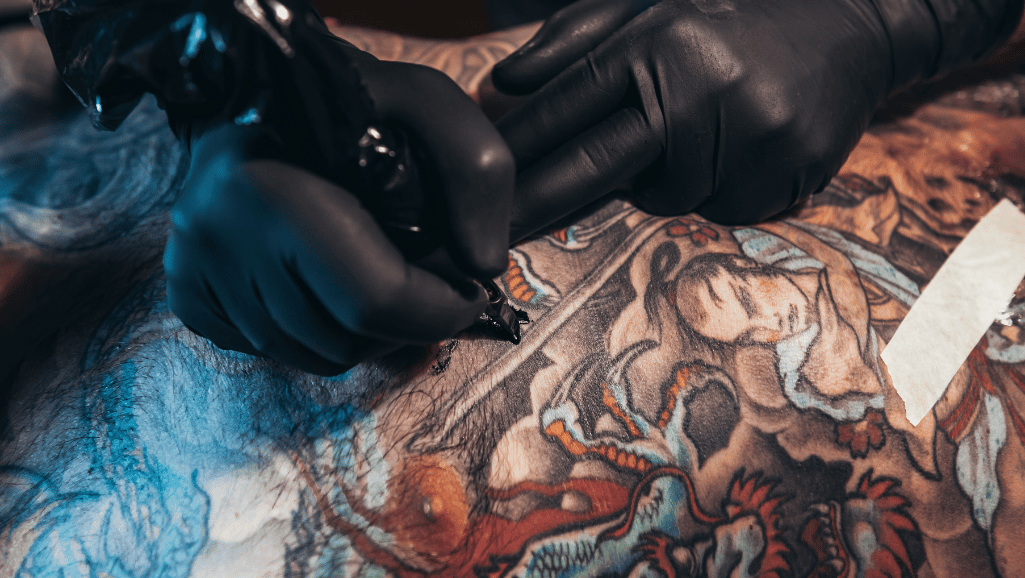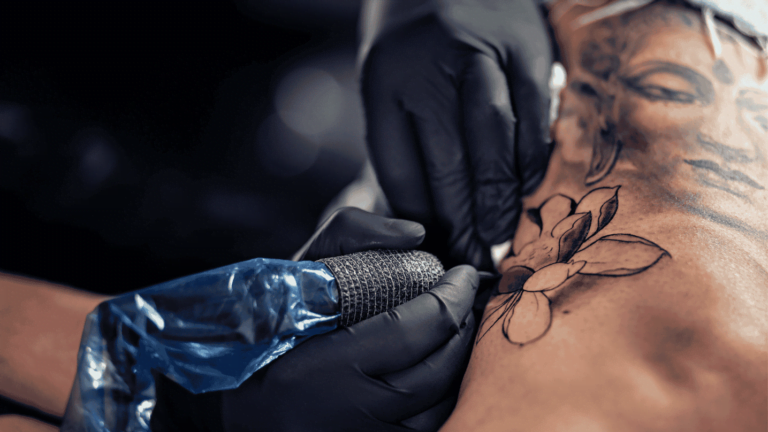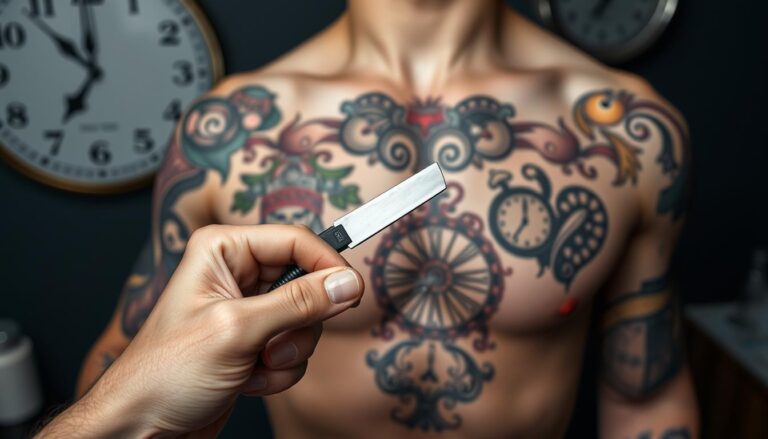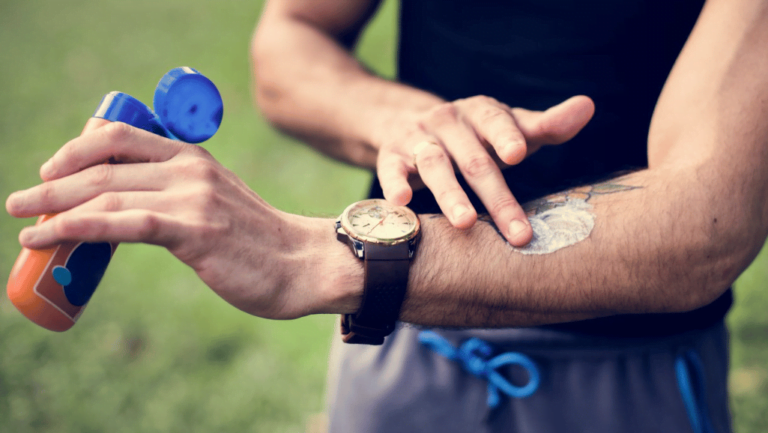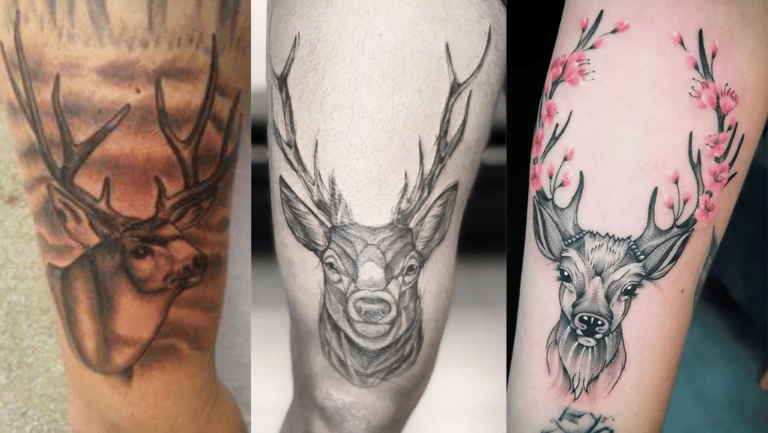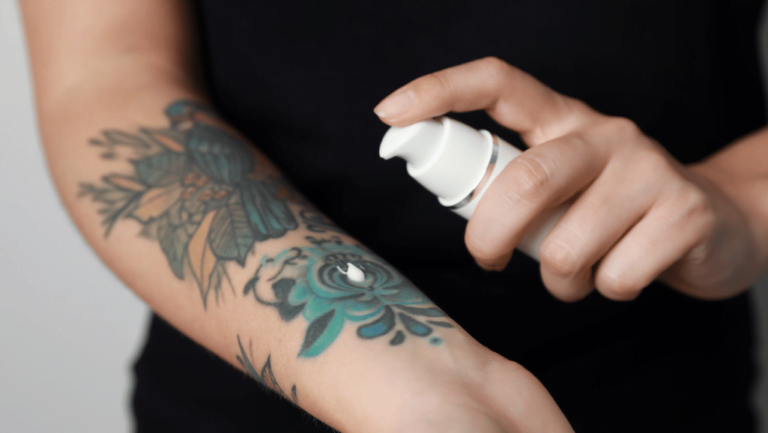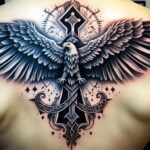Tattoo flu, a common physical response to getting a tattoo, can cause flu-like symptoms. When you get a tattoo, your body’s immune system reacts to the trauma of the tattooing process, resulting in these symptoms. While tattoo flu is not an infection or allergic reaction, it’s important to differentiate it from these conditions.
Symptoms of tattoo flu may include a mild fever, chills, body aches, dizziness, fatigue, nausea or vomiting, and swelling around the tattooed area. However, it’s important to note that congestion, runny nose, or cough are not associated with tattoo flu. If symptoms worsen or signs of infection such as pus or blood appear, seeking medical attention is advised.
Key Takeaways:
- Tattoo flu is a common physical response to getting a tattoo.
- It is characterized by flu-like symptoms such as mild fever, chills, body aches, and fatigue.
- Tattoo flu is caused by the body’s immune system reacting to the trauma of the tattooing process.
- If symptoms worsen or signs of infection appear, medical attention should be sought.
- It is important to differentiate tattoo flu from infection or allergic reaction.
What is Tattoo Flu and Why Does it Happen?
Tattoo flu is a natural response of the body to the trauma caused by tattooing. When the needle pierces the skin, it triggers the immune system to respond as if there is an injury. The pain receptors in the skin send signals to the brain, causing the release of adrenaline and increased heart rate. The immune system sends white blood cells to the area to fight off potential infection, resulting in flu-like symptoms. The immune system may become weakened during this process, making the person more susceptible to getting sick.
Understanding Tattoo Flu
Tattoo flu is a common physical response to getting a tattoo, characterized by flu-like symptoms. It is caused by the body’s immune system reacting to the trauma of the tattooing process. Symptoms may include mild fever, chills, body aches, dizziness, fatigue, nausea/vomiting, and swelling around the tattooed area. It is important to differentiate tattoo flu from infection or allergic reaction. Tattoo flu symptoms do not include congestion, runny nose, or cough. If symptoms worsen or signs of infection such as pus or blood appear, medical attention should be sought.
Common Symptoms of Tattoo Flu
When it comes to tattoo flu, there are several common symptoms that individuals may experience after getting a tattoo. While these symptoms can vary from person to person, they generally include mild fever, chills, body aches, dizziness, fatigue, nausea/vomiting, stomach ache, and swelling around the tattooed area.
It’s important to note that these symptoms are usually mild and may occur during or after the tattooing session. However, it’s crucial to distinguish tattoo flu symptoms from other signs of infection or allergic reaction. Unlike tattoo flu, congestion, runny nose, and cough are not associated with the condition.
If you are experiencing any of these symptoms and they worsen or if you notice signs of infection such as redness, pus, or unusual oozing, it is recommended to seek medical attention promptly. Early intervention can help prevent any complications and ensure proper treatment.
Summary of Common Symptoms of Tattoo Flu:
- Mild fever
- Chills
- Body aches
- Dizziness
- Fatigue
- Nausea/vomiting
- Stomach ache
- Swelling around the tattooed area
Remember, if you experience any worsening symptoms or signs of infection after getting a tattoo, don’t hesitate to reach out to a healthcare professional. They can provide the necessary guidance and assistance to ensure your well-being.
Duration and Recovery from Tattoo Flu
Tattoo flu symptoms typically last for a day or two. During this time, the body’s immune system is actively responding to the trauma of the tattooing process. As the immune system calms down, it shifts its focus towards healing the tattooed skin. It’s important to note that the duration of tattoo flu may vary from person to person depending on factors such as overall health and the size of the tattoo.
To aid in your recovery, it is crucial to prioritize rest and proper hydration. Rest allows your body to heal and recover more efficiently, while staying hydrated helps flush out toxins and supports the immune system. Additionally, over-the-counter pain relievers can help alleviate any discomfort experienced during this period.
Following proper tattoo aftercare instructions is essential for a faster recovery from tattoo flu. These instructions typically include keeping the tattoo clean, applying suitable moisturizers, and avoiding direct sunlight and excessive moisture. By following these guidelines, you can minimize the risk of complications and promote optimal healing.
However, if tattoo flu symptoms persist for more than a couple of days or worsen over time, it is advisable to seek medical attention. A healthcare professional will be able to assess your condition and provide appropriate guidance and treatment if necessary. Remember, it’s always better to err on the side of caution when it comes to your health.
Preventing Tattoo Flu
To minimize the risk of experiencing tattoo flu, there are several precautions you can take. Follow these tips to ensure a smoother and more comfortable tattooing experience:
- Choose a reputable tattoo artist: Research and select a professional tattoo artist who adheres to strict hygiene practices. A skilled and experienced artist will minimize the risk of infection and ensure a safe tattooing process.
- Maintain a clean environment: Make sure the tattoo studio maintains a clean and sanitary environment. This includes sterilized equipment, disposable needles, and proper waste disposal. A clean environment reduces the chances of bacteria and infection.
- Practice good hygiene: Keep the tattooed area clean and follow the artist’s aftercare instructions diligently. Use a mild, fragrance-free soap to wash the tattoo and avoid excessive scrubbing. Gently pat dry with a clean towel and apply a thin layer of recommended ointment or moisturizer.
- Strengthen your immune system: Prioritize your overall health and well-being by managing stress levels, maintaining a balanced diet, and getting enough sleep. A strong immune system can help prevent tattoo flu and aid in faster recovery.
- Avoid alcohol and stay hydrated: Refrain from consuming alcohol before and after your tattoo session. Alcohol can thin the blood and increase bleeding during the tattooing process. Instead, drink plenty of water to stay hydrated, which helps your body heal and flush out toxins.
- Have a healthy meal before your session: Eat a nutritious meal before getting a tattoo. A well-balanced diet provides essential nutrients that support the healing process.
By following these preventive measures, you can reduce the likelihood of experiencing tattoo flu. Remember, communication with your tattoo artist and practicing proper aftercare are key to a successful tattooing experience.
Managing Tattoo Flu Symptoms
When experiencing tattoo flu symptoms, it’s essential to take proactive measures to manage discomfort and promote a speedy recovery. Rest, hydration, over-the-counter pain relievers, and proper tattoo aftercare are key elements in managing tattoo flu symptoms effectively.
Rest and Hydration
Resting is vital for allowing your body to heal and recover from tattoo flu symptoms. Make sure to get enough sleep and avoid strenuous activities that can further stress your immune system. Additionally, staying hydrated by drinking plenty of water helps flush out toxins from your body, aid in healing, and alleviate fatigue associated with tattoo flu.
Over-the-Counter Pain Relievers
Over-the-counter pain relievers such as ibuprofen or acetaminophen can help reduce fever, relieve body aches, and minimize discomfort caused by tattoo flu. It’s important to follow the recommended dosage instructions and consult with a healthcare professional or pharmacist if you have specific health conditions or concerns.
Tattoo Aftercare
Following proper tattoo aftercare instructions is crucial in managing tattoo flu symptoms. Keep your tattoo clean by washing it gently with mild soap and warm water. Avoid exposing the tattoo to excessive moisture or sunlight. Apply a thin layer of recommended tattoo aftercare ointment to keep the tattoo moisturized and promote healing. By adhering to proper aftercare practices, you can prevent additional complications and optimize the healing process.
By incorporating these management strategies into your routine, you can effectively address tattoo flu symptoms and support your body’s healing process. Remember, if symptoms persist, worsen, or if you notice any signs of infection or allergic reaction, it is important to seek medical attention promptly.
When to Seek Medical Attention
In most cases, tattoo flu symptoms do not require medical attention and should improve within a couple of days. However, it is important to be aware of the signs that may indicate a need to see a doctor. If the symptoms persist for more than a few days or worsen, it is advisable to seek medical attention. Furthermore, the presence of certain signs should not be ignored, as they may indicate an infection or an allergic reaction.
Signs of Infection
If you notice any of the following signs of infection after getting a tattoo, it is important to see a doctor promptly:
- Pus or discharge oozing from the tattooed area
- Excessive redness, swelling, or warmth around the tattoo
- Increased pain or tenderness
- Development of a fever
- Appearance of red streaks extending from the tattoo
These symptoms can be indicative of a bacterial infection and should not be overlooked. Prompt medical attention is crucial to prevent further complications.
Allergic Reactions
In some cases, an allergic reaction to tattoo ink or products used during the tattooing process may occur. If you experience any of the following symptoms, it is important to consult a doctor:
- Rash or hives around the tattoo
- Intense itching or burning sensation
- Bumps or blisters
- Redness or swelling that extends beyond the tattooed area
These signs may indicate an allergic reaction and should be evaluated by a medical professional.
Remember, it is always better to err on the side of caution when it comes to your health. If you are unsure whether your symptoms require medical attention, it is best to consult with a healthcare provider who can provide a proper diagnosis and recommend appropriate treatment.
Conclusion
Tattoo flu is a common response of the body to the trauma of getting a tattoo. This condition is characterized by flu-like symptoms that typically last for a day or two. While rest, hydration, and over-the-counter pain relievers can help manage the symptoms, it is important to seek medical attention if the symptoms persist, worsen, or if signs of infection or allergic reaction appear.
Prevention is key to minimizing the risk of experiencing tattoo flu. Choosing a reputable tattoo artist, maintaining good hygiene, and following proper aftercare instructions are crucial steps to take. By doing so, the chances of developing tattoo flu can be significantly reduced.
In summary, tattoo flu is a temporary inconvenience that can be managed effectively with proper care. By understanding the causes and symptoms of tattoo flu, individuals can take the necessary precautions and ensure a smoother recovery process. Remember, your health and well-being should always be a top priority when getting a tattoo.
FAQ
What is tattoo flu?
What are the symptoms of tattoo flu?
How long does tattoo flu last?
How can I prevent tattoo flu?
How can I manage tattoo flu symptoms?
When should I seek medical attention for tattoo flu?
Forhad
Forhad's writing is not just about the artistry of tattoos or the latest trends in the industry; it's an exploration of the deep-rooted connections people have with their tattoos, reflecting personal narratives, cultural histories, and moments of transformation. Through a mix of in-depth features, personal narratives, and insightful analyses, he sheds light on the multifaceted nature of tattooing, revealing the emotional and cultural layers that lie beneath the surface.




